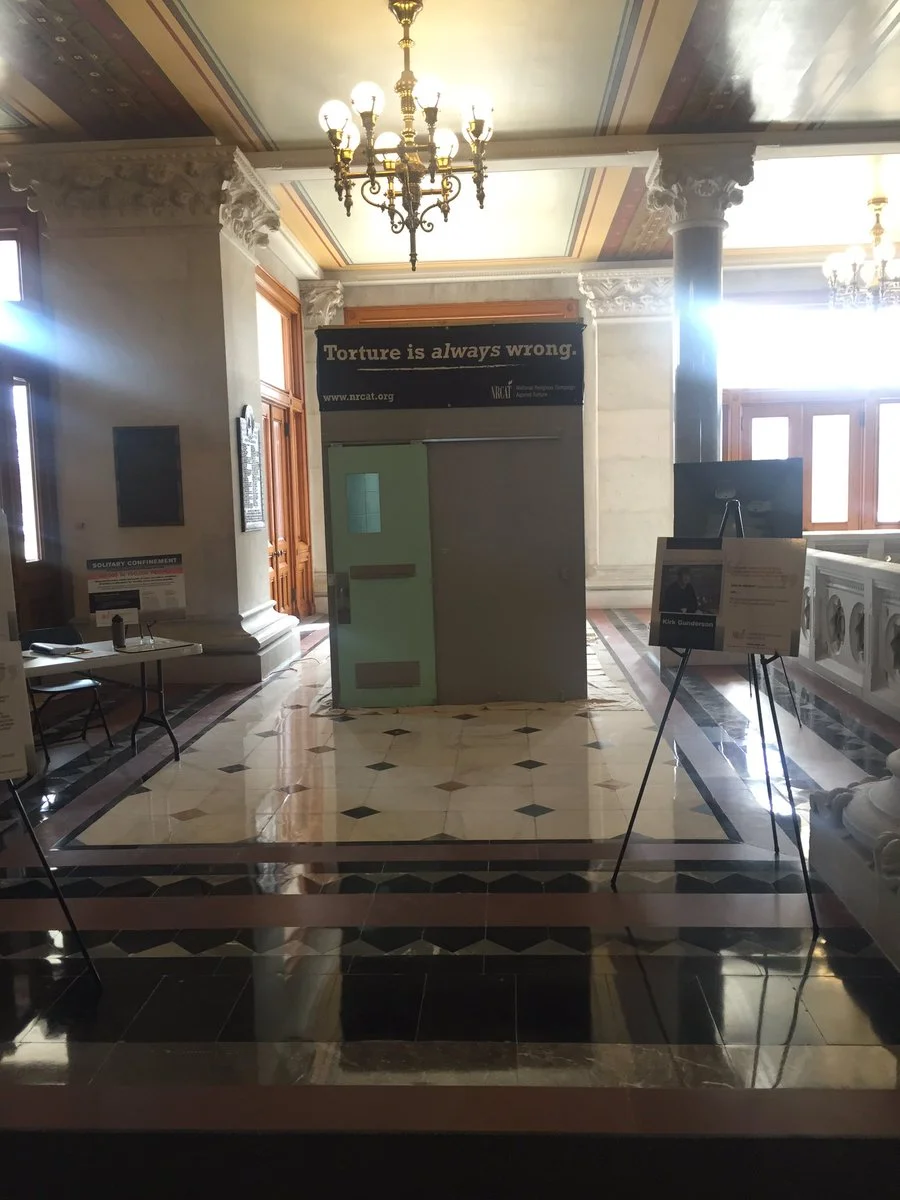Last month, the ACLU of Connecticut, The National Religious Campaign Against Torture (NRCAT) and The Yale Undergraduate Prison Project partnered to bring together Inside the Box, a multi-faceted program designed to enable solitary confinement advocates to “experience, get educated, and become equipped to advocate.”
The program ran from January 28th – February 18th, with events being held at the New Haven Public Library and two libraries on Yale’s campus. Some of these events included film screenings, namely “Solitary: Inside Red Onion State Prison” and “The Worst of the Worst.” There were also panel discussions featuring solitary survivors, authors, and policymakers – including Commissioner of Corrections for the State of Connecticut, Scott Semple, who has presided over a significant reduction of the use of solitary confinement in his state. There was even a performance piece, incorporating elements of song, dance, and narrative to bring to light some of the key issues of incarceration.
From policy-driven discussions to more personal reflections and artistic expressions, there was something for everyone over the course of the three weeks. And throughout it all, part and parcel to the program’s mission of encouraging people to truly experience solitary confinement, NRCAT’s replica solitary cell was front and center. Those who stepped into the windowless 10 x12 cell, modeled after a solitary unit in a Wisconsin prison, found themselves confronted with a reality they would be hard-pressed to forget. Particularly jarring to those who experienced the replica call was the audio track. Recorded in a solitary confinement unit in Maine, it is a discordant fusion of tortured screaming, relentless pounding, and steel doors being slammed shut. “The audio in particular rattled folks,” recalls Meghan Smith of the ACLU of Connecticut, “most people couldn’t even last five minutes.” Yet this is the daily reality for tens of thousands in solitary confinement.
As one of the program’s coordinators, the ACLU of Connecticut helped oversee the movement of the replica cell from the libraries of New Haven to the atrium of Connecticut’s state capitol building. There it remained for one week, in the nucleus of the building, directly in the path of visitors and legislators alike. Hundreds of these visitors and lawmakers took the opportunity to experience what it would be like to be held in solitary confinement.
For some, it was a brief foray into an unsettling world; a “prison within a prison” that many didn’t even know existed, and certainly didn’t know to what extent it is practiced in the U.S. For others, like Sen. Gary Winfield, D-New Haven, who has been a staunch opponent of solitary confinement for years, it was an important and effective tool to help his colleagues understand what he’s known for years – “that solitary confinement is cruel and unjust.” Senator Winfield spent two hours in the replica cell, far exceeding the amount of time most people stayed in, however, paling in comparison to the days, months, even years that many incarcerated persons experience.
For others still, the experience was about more than just politics – it was extremely personal. Ms. Smith recalls one member of the legislature who spent a “significant amount of time” in the replica cell. While confined in the cell, he kept glancing at the note he had taped to the wall – his brother’s inmate number – which served as a salient reminder of why he was there. “It was a powerful way to show that the issue of solitary confinement affects the community; it affects all people,” Ms. Smith said.
Ms. Smith attributes the success of the replica cell, in part, to the passion and fortitude of solitary confinement advocates. It was activist members of the ACLU-CT and grassroots organizations who pushed their representatives to go into the cell and experience, first-hand, the horrors of solitary confinement.
Truly, people of conscious can make a difference. By exerting pressure on our elected representatives, we can make it known that ending the torturous practice of solitary confinement is an important issue to their constituents. And now is a particularly crucial time in Connecticut to make that message known. On March 22nd, the Connecticut General Assembly introduced solitary confinement legislation. This pivotal legislation aims to limit the amount of time vulnerable populations, namely youthful offenders, seriously mentally ill offenders, and individuals with other significant mental impairment or physical disabilities, can be held in solitary confinement. There is a public hearing scheduled for Monday, March 27th. We encourage everyone to spread the word about this important legislation and the upcoming hearing, and we especially encourage those folks in Connecticut to contact their local legislators and make their voices be heard!


